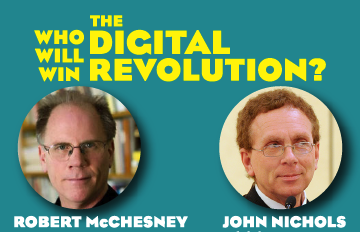Like this article? rabble is reader-supported journalism. Chip in to keep stories like these coming.
We’ve heard it before: technology’s development dramatically shifts media, politics and our connectedness to the world. Yet in the midst of our current “digital revolution,” governments and business conglomerates are swiftly seeking control, calling into question the direction that this technological movement is heading.
Robert McChesney, professor and author, and John Nichols, editor and journalist, have some ideas on how to avoid a “citizen-less democracy” which they shared last night at the Who Will Win the Digital Revolution? event in Vancouver.
“The digital revolution…that’s a profound revolution,” said McChesney. “That’s a revolution that certainly, I think, scholars would say is the equivalent of the printing press or the alphabet or writing, maybe even language itself. It’s that fundamental; redefining the nature of life as we’re experiencing it on earth. So it’s one of the big ones. It changes everything.”
This significance, McChesney pointed out, is magnified by how swiftly and exponentially technology is developing and that many of these changes result in automation and job elimination for economic gain.
To explain further, McChesney told a story of a CEO of a German company who told him that they have the technology to automate all of his factories worldwide. The company has held out, however, because he said that move would mean “the middle class in Germany would burn.”
The technology is available; it’s the politics and economic effects that are being worked out.
“We are in one of the great horror films of the past,” said Nichols. “We’re in a movie where our technological progress is an economic strategy.”
Looking ahead, McChesney and Nichols suggest that a “post-capitalist economy” and an extension or improvement of democracy is what will ensure that technology works for us, not against us.
Nichols offered a helpful illustration where he explained that — in some situations — dirty air and dirty water can be extremely dangerous. In fact, they can kill. This doesn’t mean that air and water is inherently flawed, just that it needs to be purified sometimes — just as democracy does.
“The point of what we do has to be to open up our political processes in ways as they have never been opened before and to recognize that we need to win the future.” said Nichols.
So, how do we “win the future?”
Firstly, according to Nichols and McChesney, the importance of a free and open media that explains to the public what is really going on is fundamental.
Secondly, they suggest the need for a democracy that reflects the demands of the people.
Nichols also suggested, however, the extreme importance of broadening our scope of possibility for the future so that patterns of technology for elite, capitalist gain don’t continue.
“We have fallen into a set of narrow thoughts about where we’re going,” he said. “The times we’re coming into are not going to allow for narrow thoughts. There is no narrow way out of this. There’s a great big way.”
To see the entire conversation with McChesney and Nichols, visit the live stream here.
Alyse Kotyk is a Vancouver-based writer and editor with a passion for social justice and storytelling. She studied English Literature and Global Development at Queen’s University and is excited by media that digs deep, asks questions and shares narratives. Alyse was the Editor of Servants Quarters and has written for the Queen’s News Centre, Quietly Media and the Vancouver Observer. She is now rabble’s News Intern.



